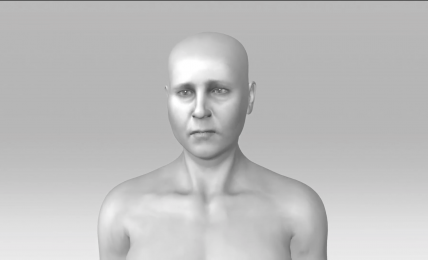Currently, lifelogging is defined as the activity of producing a continual record of your everyday life by carrying a portable camera and/or other digital devices around with you. Simultaneousness is key, although scanning important documents or cards or other memorabilia is done in order to have “complete” life storage. It is generally understood that lifelogging entails less “engagement” and subjectivity than quantifying oneself. Some people lifelog primarily to have a neater, more “high-tech” form of storage. On the other hand, the technology and rationale for quantifying oneself is more involved, a movement that incorporates technology for data acquisition of a person’s daily life.1
The technology generally used, which includes wearable sensors, collects data and analyzes inputs, mental states, and performance. The user can then review daily progress in the form of charts and other statistical analyses. If you look at life as a linear progression and humanity as a dot moving along that line, lifelogging tends to focus on what is to the left of the dot (our past), while quantifying oneself tends to focus on where the dot is (present) in relation to the right (the future); quantified self-tracking is more focused on enhanced, efficient self-awareness, performance, and communication whereas lifelogging may have more vague, objective goals.
These two topics may seem rather separate but they are commonly discussed together because they have the shared idea of making life mean “the most.” Lifelogging wants to cherish life’s moments by extending the capacity of memory, by having one’s entire life at your fingertips. Quantifying one’s self is about observing and reacting, noticing parts of life where one could do better or noticing times of day where one is most effective, the mood swings, the blood pressure drops, the weight gain, the sleep cycle. Our life and our selves are so important that we need to keep meticulous track of our daily functions.
Quantifiers track these parts of life and life loggers collect them almost as a form of enlightenment. That is to say, once we better understand humanity (through better understanding ourselves), we can become a better humanity. Instead of ignoring those extra pounds, instead of blocking out those years of isolation or rejection, we observe or at least gather them.
But, is it a good idea to always be confronted by the data we generate?
Throughout the more recent decades we have seen much photojournalism, diary-keeping, and tactics to improve ourselves or self-reflect. Although, even more recently, we have encountered phenomena large and extreme enough to be categorized as “lifelogging” and “quantifying oneself.”
Lifelogging is simpler because it may not require as much analysis as quantification. The conceptualization of “Memex” around 1945, marks a beginning of quantifying devices. Vannevar Bush was the mastermind behind “Memex;” he believed that a collective memory where one was able to store, index, and archive their personal information would allow greater accessibility of information and the ability to analyze and refer to past events.
This hypertext would be able to provide immediate access to information, and although Bush’s “Memex” was never created, his invention would influence a whole new array of more advanced and specialized technology like early hypertext softwares and even later, the World Wide Web.
Perhaps the best and most comprehensive example of lifelogging is Gordon Bell, age 72, who unfortunately is unable to give a substantial reason, purpose, or use for lifelogging – though he hopes that his leadership will provoke others to find that missing link. It is important to note that Bell has had a prominent role in the prevalence and advancement of technology today: In the 1970s, Bell was one of the first designers of a computer and in the 1980s he was working on the network that became our “Internet.”
Bell initially started “scanning his life,” from the things that mean the most to him down to the very precise details of his days, and then throwing away the physical versions (if one existed). Scanning included: t-shirts, coffee cups, emails, photos, manuals, Web history, health records, phone records, interests, activities, good meals, places he likes to visit, and so on. According to Bell, “The project began in 2001 and has since recorded 1,300 videos, 5,067 sound files, including conversations, 42,000 digital pictures, nearly 100,000 emails and 67,000 webpages.”
Later, with help from inventions like the “Memex” and “SenseCam,” Bell was able to create an even more extensive personal archive that includes not only pictures and various memorabilia but also his daily transactions and encounters. His project became “MyLifeBits.” The SenseCam is worn daily and it takes pictures about every 20 or 30 seconds (as many as 2,000 photographs a day) to literally record every action of his day. There are only 12 SenseCams in the world today and they are hypersensitive to light changes. When they sense differences they take pictures.
Bell’s idea is essentially a much more sophisticated version of a scrapbook. The idea is that if a stranger had access to Bell’s “MyLifeBits,” he or she would be able to know Mr. Bell on an intimate level, but Bell says that he is going to limit who can see his project to probably only his children. Although the value and direction of Bell’s “MyLifeBits” project is still somewhat ambiguous and open to interpretation, the project’s mission assumes that lifelogging will become much more popular and prevalent in society.
Could this be useful to learn about other cultures, about deceased relatives, an extracurricular activity to help form a sense of identity? What implications could this have on our value or capacity for memory? Bell, still hoping that others will follow his lead and answer these question for themselves, speculates that these types of projects will allow our minds freedom to be more creative. (Why use your limited brain capacity for something a computer can infinitely store?)
Bell emphasized the importance of some of the more practical uses in 2006, like being able to retrieve renovation documents, information on your house in case of a natural disaster, bills, and much more. Essentially, these projects could sort out our tangled, overwhelming, information-rich lives. Although being a follower may also require a similar outlook on life, Bell advises youth to never delete anything because he thinks that “everything in life is so important!” So the “I love you” messages should be kept as well as the “how are you?” emails. Bell is at the forefront of this society-altering technology like he was with the computer and Internet.
Microsoft speculates that it has only scratched the surface of the benefits of total recall. But, is there a reason that we forget parts of our life that are harmful, dissatisfying, or comfortable? Is there a distinction to be made in remembering the past and having access to the past, if this biological counterpoint is lost or decreased due to increased lifelogging? Would there be negative repercussions? Or would the concept of “memory” be altogether changed?
Unlike lifelogging, self-quantifying seems to have a much larger base and many potential purposes. People can record, graph, or compare any statistic derived from their life, from their most productive time of day to their sexual patterns, and use these statistics to analyze themselves and in many cases try to improve themselves.1
In 2009, Melanie Swan’s article on “Emerging Patient-Driven Health Care Models: An examination of Health Social Networks, Consumer Personalized Medicine and Quantified Self-Tracking,” found three prominent uses for quantified self-tracking. In her research she found that Quantified self-tracking tools like “FitBit,” iGoWearFit,” oTweet what you eat!”weKickbee,”iand “23andMe”3(among many more) were all highly effective in motivating people to be healthier and obtain results, as many other studies have also speculated. Swan’s research delved deeper when she looked at other aspects of technology (somewhat of a mix between quantified self-tracking and “public” lifelogging) that could be beneficial to the medical field as well, like social networking. Social networking allows the invaluable ability to connect with others who are going through or have survived the same medical issues: sites like “PatientsLikeMe,” “CureTogether,” “Inspire,” “DailyStrength,” “I’m too Young for this” (for youths with cancer), and “WeareDiabetics” offer forums to discuss personal issues, ways to get through daily struggles, insight and hope. These sites are so valuable because they offer services that patients may not be able to find in their friends, family, or doctors who do not know their illness on the personal level that other patients may.
Swan highlights the advantages of online forums where you can directly speak to and consult a physician or a database that helps translate your symptoms to better explain the problems you might be experiencing. These forums can include “Physician Question and Answer pages” like “MedHelp.” Today there are even “Yelp!” reviews of physicians so that you may pick one that best suits your needs. Swan believes that quantifying will provide us the ability to transform how patients can care for themselves and how doctors can more effectively use their knowledge. Ultimately, Swan sees an optimistic future where we can better communicate and use our resources to benefit everyone.
Many current users have also commented on how motivating self-tracking techniques can be. Having that number is not ambiguous. You can clearly see progress or regression and you want to constantly out-do yourself. The technology involved in this movement is more expansive, and is being released and created at quicker rates, generally making prices more affordable.
Tools for self-quantifying can include phone apps, watches, headbands, necklaces, tooth pieces, and online data entry. Self-quantifying also works on a spectrum with users who may just record their REM cycle or use a Fitbit to see how much they walk daily to those who quantify their every action (sex, working out, walking, gas mileage, eating, sleeping, Internet usage, energy “slumps”) and emotion (hunger, anger, motivation, happiness). The apps are endless. The user base cannot easily be generalized but many of the blogs, articles, and interviews include people in their early 30s to late 40s who are “high-tech” and “high-achieving,” which suggests that a particular subset of our population is especially prone to enjoying these habits.
Reasons are almost all personal and specific but usually share the desire of knowledge for self-betterment or for some long-term goal of enlightenment about one’s life.
Stephan Wolfram, the blogger of “Personal Analytics of [his] Life” and a mathematician and theoretical physicist, started self-tracking a long time ago because of his fascination with data. Many followers of this movement begin in vaguely different places with different motives but after a while they are hooked because it is a new, enhanced way to live their lives. Wolfram explains it perfectly: “As personal analytics develops, it’s going to give us a whole new dimension to experiencing our lives. It won’t be long before its clear how incredibly useful it all is… everyone will be doing it, and wondering how they could have ever gotten by before. And wishing they had started sooner, and hadn’t “lost” their earlier years.”
Ironically, to hypothesize about the future we may need to look into the past. In doing so, one can realize the great power and implications this technology and these movements can have in relation and accompaniment to other past movements and that similar concepts have been around for a while. This quote by Steven Cherry regarding Gordon Bell’s project helped put things into context: “MyLifeBits is really the culmination of a 2700-year historical trend. Ever since the Greeks took the Iliad out of the singsong voices of traveling balladeers and set it down on clay tablets, the world’s troves of recorded information have swelled relentlessly. Not surprisingly, humankind’s strategy has been to rely less and less on actually remembering, and more and more on being able to find something when we need it. The Gospels, Gutenberg, and Google have all been steps along the way.”
Cherry realizes that lifelogging as a concept has been developing for centuries. Among its many possible purposes it could be prevalent just to make life a little easier. On the other hand, isn’t there a connection to be made between Gordon Bell, the avid life-logger, and someone who is obsessed with social media? This hypothetical person is obsessed with putting everything on social networking sights for everyone to view, like, or comment on. While this connection may be made, there is an important distinction between the two that makes all the difference: Bell keeps his log private while the latter person mentioned wants everyone to see it. Either way, maybe there is an underlying tone of narcissism, the idea that our life is so important and that every part of it (the good, the bad, the ugly) needs to be captured for “public good.” Or that unless something is documented it doesn’t have real value or worth. You met Brad Pitt, but do you have a picture to show it? One worries that, paradoxically, in an effort to capture everything, we will value and experience nothing.
Doubtably, this hyper-awareness in the form of extreme lifelogging will lead to more useful knowledge. Particularly with lifelogging, it is a phenomenon that will not prevail in the sense of having consistent follower bases or to the extremity of Bell. It might be used mildly for anthropological research or even required of certain students but I do not think that lifelogging will become popular for the same reasons that quantified self-tracking might become more popular: our culture. Lifelogging will not be as popular as quantified self-tracking because it produces no real product, and as Americans we value education and work but generally only truly as a means for the impending success; we really want to invest as little time, money, and effort as possible. Lifelogging is less focused on the self; it can be as valuable (or more) to other people as to us, which makes it less appealing. If one’s log is private then there appears an absence of a product (validation through others) and if the log is public problems like judgment and insecurities arise. Taking it further, would lifelogging lead to a police state where our actions could constantly be viewed? Abigail J. Sellen and Steve Whittaker, coauthors of “Beyond Total Capture: A Constructive Critique of Lifelogging,”ivery clearly outlined the “R’s”iof lifelogging that define its benefits: recollecting, reminiscing, retrieving, reflecting, and remembering intentions
Additionally, people who are concerned about the knowledge available for posterity, like the late Robert Shields, might value lifelogging. Shields kept a 37.5 million word diary, and when asked why, replied with a hint of uncertainty: “Maybe by looking into someone’s life at that depth… they’ll find out something about all people.” I predict lifelogging will continue to be a marginal activity until a clear purpose that motivates people is created. When lifelogging is regarded as useful and is more accessible to the public, people may adopt Shield’s point of view.
It is difficult to imagine a future where people would voluntarily record the secret, ugly parts of their life, where they would sift through their emails and photos for hours. That is a lot of organizing for the generally messy lives we lead. Although lifelogging may not become a regularly and widely used practice, I predict that quantified self-tracking, at least for a short period of time, will.
Related to American culture, quantified self-tracking is more narcissistic, competitive (against others or yourself), and it contains a system for self-improvement and comparison. Humans have an innate desire for self-knowledge and introspection. We are fundamentally, deeply narcissistic. But this is what makes us such a progressive species. We are reward-driven and like having gratification for the product we create or perfect.9 Although there is a fine line between competition with others and isolation from others. Will self-obsession destroy the importance of human interactions and relationships? Tracking will also give participants a feeling of purpose. We will be tempted to skip the midnight snack because when we see our low calorie count for the day we will feel rewarded or noticed. In this way I think the heightened “awareness” is incredibly positive, although, like most things, there are always good and bad parts.
The increased use of self-tracking will make our society even more obsessed with being “first in the race.” We will be able to literally quantify everything with numbers and values and many people will inevitably begin to equate these quantities to their self-worth.
Numbers and their outputs are explicit — either wrong or right — but life contains many things that (should) work on a spectrum, such as emotions and morality. Technically this awareness will never fail us. It will always be accurate, but we may not always want or need this awareness. Our bodies are complex and our natural instincts are important to listen to. Even when they fail us, it may be for the better in the long run. It will be hard to find a balance between being able to log one’s notion of the ideal here and now and being able to be in the here and now. On the other hand, quantifying oneself can be positive in certain areas of life, as with physical health. Fitocracy and the other fitness apps give people the push they need to succeed, and eventually the extrinsic motivation will be confounded with intrinsic. For instance, when they see how much better they feel and look or how much easier certain tasks are, they may be more inclined to physically push themselves, not just because of the badges they may earn but because they have an intrinsic desire to.
This highlights the important difference between the two types of gamification or self-tracking apps: self-betterment ones and competitive ones where you are pitted against friends, family, and co-workers. (The latter may be valuable at getting people to do more work.) But looking at the bigger picture they would make people power-hungry, incredibly competitive, and possibly even willing to ruin relationships. Also, the concept of doing things just to do them, to be a good person, would disappear with everything documented and reacted to. We would start (even more than today) quantifying the value of every possible action. This would lead us into dictating our life’s worth and give us a heightened need for instant gratification or immediate feedback.
People may especially value these apps because they prioritize things for us. Many people would love these apps in their life because in a world with endless ambition, opportunities, and people, they would provide guidance for our competitive selves. They allow us to know if we have failed, or where we stand when compared against others. A world where we are literally defined by numbers could easily become a world where our self-worth is dictated by these numbers. This self-tracking with physical health could be highly effective. But for it to consume many facets of our everyday life — social, work, family life — seems dangerous.
:::

Dora O’Donnell is a senior at James Madison University studying International Affairs and French. She lives in Washington D.C. with her five siblings and parents. She loves exploring through traveling, hiking, biking, and learning, and when she graduates she hopes to work for a non-profit helping disadvantaged children.
Works Cited
Cherry, Steven. “Total Recall.” IEEE Spectrum, 1 Nov. 2005. Web. 11 Apr. 2014. <http://spectrum.ieee.org/telecom/security/total-recall>.
“Internet Encyclopedia of Philosophy.” Stoicism . N.p., n.d. Web. 11 Apr. 2014. <http://www.iep.utm.edu/stoicism/>.
Landow, George P. “Vannevar Bush and the Memex.” Brown University, n.d. Web. 21 Apr. 2014.
“Lifelogging / Quantified Self.” Lifestream Blog, n.d. Web.
“Living on Earth: Life Bytes.” Living on Earth. N.p., n.d. Web. 11 Apr. 2014. <http://www.loe.org/shows/segments.html?programID=06-P13-00003&segmentID=4>.
Martin, Douglas. “Robert Shields, Wordy Diarist, Dies at 89.” The New York Times. The New York Times, 28 Oct. 2007. Web. 11 Apr. 2014. <http://www.nytimes.com/2007/10/29/us/29shields.html?_r=2&>.
Sellen, Abigail J., and Steve Whittaker. “Beyond Total Capture: A Constructive Critique of Lifelogging.” Communications of the ACM. James Madison University, n.d. Web. 11 Apr. 2014. <http://cacm.acm.org/magazines/2010/5/87249-beyond-total-capture/fulltext>.
Swan, Melanie. “Emerging Patient-Driven Health Care Models: An Examination of Health Social Networks, Consumer Personalized Medicine and Quantified Self-Tracking.” IJERPH: International Journal of Environmental Research and Public Health, 09 Jan. 2009. Web. 11 Apr. 2014. <http://www.mdpi.com/1660-4601/6/2/492>.
Wilkinson, Alec. “Remember This?” The New Yorker. The New Yorker- Department of Technology, 28 Mar. 2007. Web. 11 Apr.2014. <http://www.newyorker.com/reporting/2007/05/28/070528fa_fact_wilkinson#ixzz2CU34Xn5B>.
Wolfram, Stephen. “The Personal Analytics of My Life—Stephen Wolfram Blog.” Stephen Wolfram Blog RSS. N.p., 8 Mar. 2012. Web. 21 Apr. 2014.
<http://blog.stephenwolfram.com/2012/03/the-personal-analytics-of-my-life/>
Context Links
Gordon Bell’s Home Page
John Havens’ analysis of how big data can help us
A constructive critique of lifelogging, from the Association for Computing Machinery



